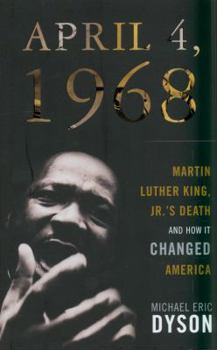April 4, 1968: Martin Luther King, JR.'s Death and How It Changed America
Select Format
Select Condition 
Book Overview
Celebrates the leadership of Dr. King and challenges America to renew its commitment to his vision This description may be from another edition of this product.
Format:Hardcover
Language:English
ISBN:0465002129
ISBN13:9780465002122
Release Date:March 2008
Publisher:Basic Civitas Books
Length:290 Pages
Weight:0.94 lbs.
Dimensions:1.1" x 5.4" x 8.1"
Customer Reviews
4 ratings
Stanky's Review of April 4, 1968
Published by Thriftbooks.com User , 14 years ago
Dyson does show systematicaaly how King's death changed America. The Black population came out of their shell and now openly voiced their rightful place in America. I suppose like any oppressed group of people, they initially "opened up' with violence, but over the years their "proper" leadership sought justice, much like Dr. King, with educated non-violent mode of action. As a Caucasian, I thought Michael Eric Dyson's book informed all readers that Dr. King promulgated peace and love for all humanity.
Great Price, Product arrived in condition as described
Published by Thriftbooks.com User , 15 years ago
Great book, great price. The product arrived in even better condition than described. Would recommend and purchase again.
Great Writing
Published by Thriftbooks.com User , 15 years ago
Dyson does a great job in this book. He dives into the subject with great passion and reveals the importance of this work. This is a must read.
Excellent Book on the Legacy of 4/4/68
Published by Thriftbooks.com User , 16 years ago
I remember, as a child, visiting my great-aunt and uncle in their mansion (they were millionaires) and seeing a magaizine whose cover depicted a watercolor of a burning city. Asking what was the reason for this, I was told that people had rioted after the murder of Martin Luther King, Jr. Fifteen years after this, I remember asking my great-aunt why there were no blacks who were members of her country club. "They can't afford it, honey," was her well-meaning but incredibly myopic response. It is hard enough as a white person to really, genuinely, empathize with the experience of African Americans. We can imagine, yes; but the act of imagining is itself a kind of comfortable exercise that can lead us to conclude that we "understand." In truth, we don't. And maybe we never will. Maybe all we can do is just shut up once in a while and listen. This book can help. In the room that looks out onto the balcony where Dr. King was murdered, my favorite gospel hymn plays softly; it was Dr. King's last request that the musician for the April 4th's evening service play "Precious Lord, Take My Hand." The haunting pathos and sense of security that this hymn gives is enough to make this atheist hope that, somehow, Dr. King died knowing that his death would be the final, crowning act of this great American story. If we look at life and history through the prism of King's life, and the pasing of years to the present day, we gain a greater appreciation of just what is at stake in American life today. Moreover, we sense the tremendous barriers that still remain, despite all the platitudinous protestations of the neo-conservatives and right wingers to the contrary. The value of a book like this is it makes us stop and listen. Another reviewer has gently attacked the artifice of an interview with Dr. King from today's perspective; frankly I think that, after studying King as much as he has, Mr. Dyson has every right to channel a conversation with the man himself. but I do not think that anyone can argue with Dr. King's last, albeit imaginary, statement. I love Oprah too.





